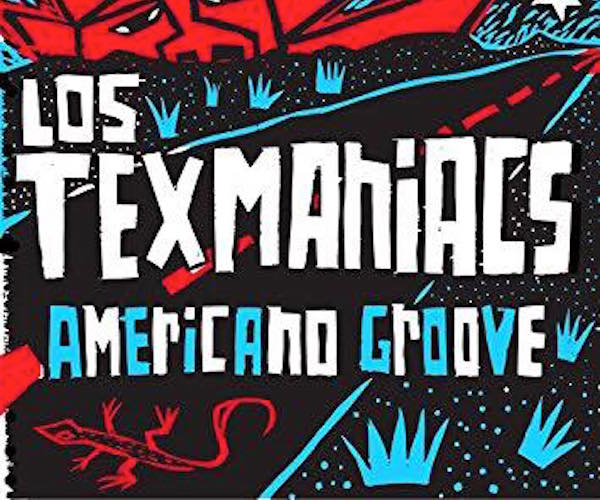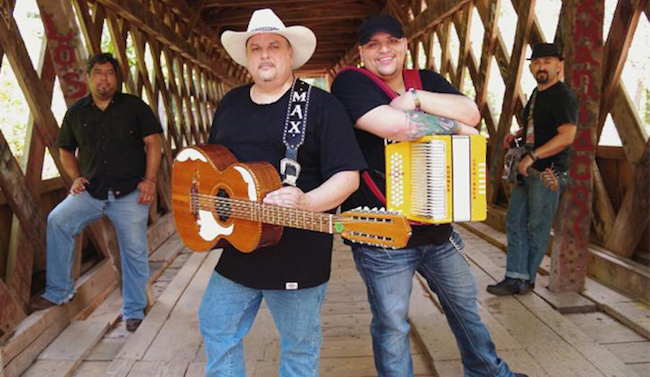Music Interview: The Americano Groovers — Los Texmaniacs Come to Rhode Island’s Rhythm and Roots
Chances to hear conjunto music in New England are rare; bravo to Rhode Island’s Rhythm and Roots.

By Noah Schaffer
As global ambassadors of the Tex-Mex conjunto sound, San Antonio’s Los Texmaniacs have played in South America, Europe, and Asia.
But chances to hear conjunto music, which is thriving in Texas, are as rare in New England as they are overseas. This summer is an exception: Los Texmaniacs are playing at both the Lowell Folk Festival this weekend and Rhode Island’s Rhythm and Roots in September.
The band was founded in 1997 by bajo sexto player Max Baca, who had previously played in the supergroup Texas Tornadoes with Doug Sahm, Flaco Jimenez, and Freddy Fender. In 2009 and 2012 they released a pair of albums that — despite appearing on the Smithsonian Folkways label — brought a taste of swing and rock to the conjunto tradition. 2015’s richly textured Americano Groove is, to my ears, a crossover masterpiece, filled with terrific original material and fueled by the efforts of guests such as Alejandro Escovedo and country crooner Rick Trevino. It also showcased accordionist Josh Baca, Max’s nephew. The band is now preparing another Folkways LP release; the focus will be on songs about immigration.
Recently, The Arts Fuse spoke with Baca from his Texas home about the past and future of conjunto music.
The Arts Fuse: Although you’re strongly identified with Texas music, you were born and raised in Alberquerque, New Mexico. That state has its own great musical heritage with artists such as Al Hurricane. It is a scene that gets a lot less attention. Were you involved with New Mexican music before you moved to Texas?
Max Baca: When I was growing up my father was an accordion player. He learned how to play Tex-Mex music — his influences were Narciso Martínez and the norteño guys from south of the border. A lot of times we’d go play at Native American Pueblo reservations around New Mexico and Arizona. They’d say “Mr. Baca we love your ‘chicken scratch’ music.” Now there’s a scene called ‘chicken scratch,’ where Native Americans play the same songs we’d performed — but they don’t sing, it’s all instrumental. My dad is credited in the Smithsonian for influencing ‘chicken scratch’ music. He had been a World War II veteran and brought an accordion back from Europe. In the early ’70s Arhoolie Records was interested in documenting his music, but he had started a family and was working as a CPA to support his family. The funny thing is the first two songs I learned from him as a little kid were the polka “Monterrey” and Glenn Miller’s “In the Mood.” Los Texmaniacs draws on all kinds of music.
AF: For those who aren’t familiar with Tex-Mex conjunto music, please explain how it differs from traditional Mexican music.
Baca: Tex-mex music was influenced by the Germans and Czechs that settled in Texas and brought over the button accordion. Narciso Martínez and Santiago Jimenez Sr. were among those that heard the German oompah sound on the radio in places like New Braunfels. So we picked up the accordion and incorporated the instrument I play, the bajo sexto, which is a 12-string guitar with bass strings. We’d play polkas, waltzes and all the other German sounds, but now we had an accompanying instrument in the bajo sexto, so the accordions could get flashier and a bit more sophisticated in their playing. Once this music started spreading over Texas, the guys from Mexico heard the sound. It became popular all along the border states, like Arizona and California, and the Northern Mexican regions, where they started calling it norteño.
AF: There’s a third generation of Bacas, now that your nephew Josh joining the band. (In Lowell, Josh Baca will be part of a “Big Squeeze” accordion workshop that will also include zydeco artist C.J. Chenier and Pastelle LeBlan of the French-Canadian group Vishten.)
Baca: Yes, my little nephew — he was taught by his dad — my brother — and then lately Flaco Jimenez kind of took him under his wing. I’ve played with Flaco pretty much half my life, and it’s very rare that he’ll sit down with someone and show them a lick or give them advice. But he took me under his wing and now he’s taken a liking to Josh, giving him his secret recipe about how to play with feeling. Josh just turned 26 and at first tended to be on the wild side and play every note. Flaco showed him how to settle down and discipline himself. He’s come a long way; new he’s both a fantastic accordionist and a showman and he was born to be on stage.

A look at the Los Texmaniacs. Photo: Los Texmaniacs.
AF: Of course, you’ve made many recordings with Flaco, and still perform in his band and as a duo, but in the Texas Tornadoes you also performed with Doug Sahm. His mix of Tex-Mex, psychedelic rock, blues and country can be found on your Americano Groove LP.
Baca: At the gigs, Sahm would turn around and say ‘hey man look, this is what it’s all about — you have to be open minded and be into taking your instrument to another level instead of just into playing your instrument and taking it to another level.” I learned a whole different way of thinking. Now I listen to every style of music and blend those influences into my bajo sexto playing — especially bluegrass and folk. I’ve had the chance to record with bluegrass artists like Ricky Skaggs, Peter Rowan, and the late Charles Sawtelle — not to mention on the Rolling Stones’ Voodoo Lounge album. I never thought I’d record a song with Mick Jagger and Keith Richards and win a Grammy playing a traditional instrument! Flaco says that the bajo is the brother of the accordion. If you don’t have the bajo and the accordion it’s not Tex-Mex — and that means it is not conjunto! They’re brothers in crime when it comes to creating an authentic sound.
AF: What made you want to expand your sound on your last album?
Baca: There are a lot of new conjunto groups coming out, and they’re quite good, but generally they’re just covering the songs of the pioneer conjuntos — imitating accordionists like Flaco or Mingo Salvidar or Steve Jordan. Although Steve Berlin of Los Lobos produced the album, I didn’t want us to be another band that just sounded like the Tornadoes or Los Lobos. I wanted it to sound like us; that’s why we embraced the concept that we are playing modern music, but with traditional conjunto elements. That’s why I can do a bajo solo that sounds like the take of a distorted lead guitar or the accordion can play blues riffs and jazz riffs. Still, it is within boundaries. We’re still sticking to our roots. One of the conjunto pioneers, Tony de la Rosa, insisted that you could play a tearjerker, a country song, a polka, or rock ‘n roll — as long as it has an accordion and the bajo sexto it is conjunto! So every song on the album was an original that we or one of our collaborators wrote, except for one traditional song by Narciso Martínez from 1932.
AF: Do you change your set depending on where you’re playing? I’m guessing the audience at a dancehall in Texas may want something different than the audience at a folk or roots festival in New England?
Baca: You know, when we got invited to do Prairie Home Companion I talked to Garrison Keillor about what to play and he said “do Max Baca.” So we did traditional conjunto and it worked. We rock out a bit, but we are pretty traditional, and people want to hear that sound because it is unique and priceless. There’s not too much of it. When we play I use my judgement; I figure out if this is a dance crowd or that this is a hip crowd and we should do (Doug Sahm’s) “She’s About a Mover.” So the song selection may change, but the overall concept remains the same. One thing I love about playing folk and roots festivals is that we can collaborate with other musicians. That’s something Flaco taught us. A lot of people have never heard a bajo sexto playing Cajun or bluegrass or folk, so we love being able to incorporate those musics. That’s what we’re all about.
Over the past 15 years Noah Schaffer has written about otherwise unheralded musicians from the worlds of gospel, jazz, blues, Latin, African, reggae, Middle Eastern music, klezmer, polka and far beyond. He has won over ten awards from the New England Newspaper and Press Association.
Tagged: Americano Groove, conjunto, Los Texmaniacs, Lowell Folk Festival, Max Baca, Noah Schaffer, Rhythm and Roots
